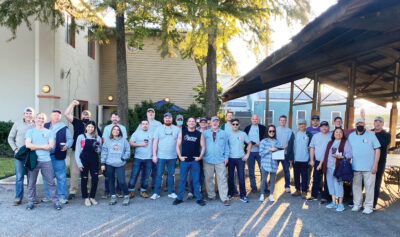In the Southeast, there are signs of Hardwood sales slowing down, but one lumberman interviewed indicated his sales were full-speed-ahead.
On the day that a lumberman in Mississippi was interviewed, he said, “It’s a vast difference from where it was a few days ago. As of today, it’s pretty slow. It’s come to a halt. People have started saying, ‘Hold up; don’t ship.’ We sell to a lot of furniture manufacturers. We do business on the West Coast, and out there, from the reports I get, the furniture manufacturers’ warehouses are full of furniture. They can’t ship anything. They had to curtail production.
“In the Southeast, I hear that the orders are being cancelled,” he continued. “They have said they will be shipping their products again in a month or two. As of right now, sales have pretty much come to a stop. I was told that the manufacturers in the Southeast don’t have orders for their products.”
He said his market is “exponentially worse than it was three weeks ago.”
He handles all species indigenous to the Southeastern United States including Oak, Poplar and mixed Hardwoods. He sells anything from pallet lumber to FAS, primarily 4/4. “We do some 5/4 and 6/4,” he added.
“We sell to furniture manufacturers and to people who make frames for furniture,” he stated. “The people who make frames for furniture have said they don’t have orders from the furniture manufacturers. It could be shipping issues. We also sell to end users. The flooring manufacturers are doing well. Flooring sales seem to be doing fine.
“Our transportation is mostly via flatbed but we use rail to the West Coast. Rail companies are using their own containers. A lot of companies can’t get their lumber on rails like they used to and this puts more pressure on trucks in the Southeast. Our freight rates have gone up and trucks have been harder to find. We’ve been able to move things but the cost has gone up a lot.”
A flooring manufacturer in Arkansas said, “The market is slowing down a little. The overall housing and economic activity is down. Houses aren’t being finished and floors are installed toward the end of the process. This is the beginning of what appears to be somewhat of a housing recession we’re going into. Everybody in our industry is seeing the same thing. The market has been up and it’s going to slow down. It’s going to get a little tough on everybody and the strong will survive.”
Compared to several months ago, he said the market was “worse, and the outlook for the next six months is certainly worse than that.”
He handles Red and White Oak, Maple, Hickory and Walnut in No. 1, 2 and 3 Common all in 4/4.
He sells to wholesale distributors nationally. “Their sales are declining compared to six months ago,” he observed.
Asked about factors that are hurting his business, he replied, “Diesel prices are severely affecting our business. That’s the main thing.”
In contrast to the Mississippi and Arkansas lumbermen, a sawmill representative in Tennessee had good things to say about his market. “For the most part,” he stated, “everything is still moving really well and I would say that the market is strong to stable.
“It’s probably a little bit worse than several months ago, but it’s still good,” he said.
He sells all major Appalachian species: Red and White Oak, Hickory, Hard and Soft Maple, Poplar, Ash and Cherry. He sells Red and White Oak in No. 3A to FAS and all other species in No. 2A and Better.
Eighty percent of his sales are to end users: the makers of flooring, moulding, trim, window and door jambs, cabinetry and furniture. He also sells to distribution centers. “Everybody seems to be doing well in the industry domestically,” he said. “I don’t export-direct; I sell to North American exporters.
“Trucking has been an issue,” he observed. “We own our own trucks. We’ve had our own issues with freight costs and labor force, as far as getting truck drivers. Transportation hasn’t been easy.”









